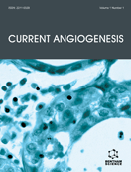Abstract
Radiation therapy or the combination of radiation and chemotherapy is an important component in the local control of many tumor types including glioblastoma, rectal cancer, and pancreatic cancer. The addition of anti-angiogenic agents to chemotherapy is now standard treatment for a variety of metastatic cancers including colorectal cancer and nonsquamous cell lung cancer. Anti-angiogenic agents can increase the efficacy of radiation or chemoradiation for primary tumors through mechanisms such as vascular normalization and augmentation of endothelial cell injury. The most commonly used anti-angiogenic drug, bevacizumab, is a humanized monoclonal antibody that binds and neutralizes vascular endothelial growth factor A (VEGF-A). Dozens of preclinical studies nearly uniformly demonstrate that inhibition of VEGF-A or its receptors potentiates the effects of radiation therapy against solid tumors, and this potentiation is generally independent of the type or schedule of radiation and timing of VEGF-A inhibitor delivery. There are now several clinical trials combining bevacizumab with radiation or chemoradiation for the local control of various primary, recurrent, and metastatic tumors, and many of these early trials show encouraging results. Some added toxicities occur with the delivery of bevacizumab but common toxicities such as hypertension and proteinuria are generally easily managed while severe toxicities are rare. In the future, bevacizumab and other anti-angiogenic agents may become common additions to radiation and chemoradiation regimens for tumors that are difficult to locally control.
Keywords: Bevacizumab, radiation therapy, anti-angiogenic therapy, glioblastoma, rectal cancer, pancreatic cancer.
 12
12

